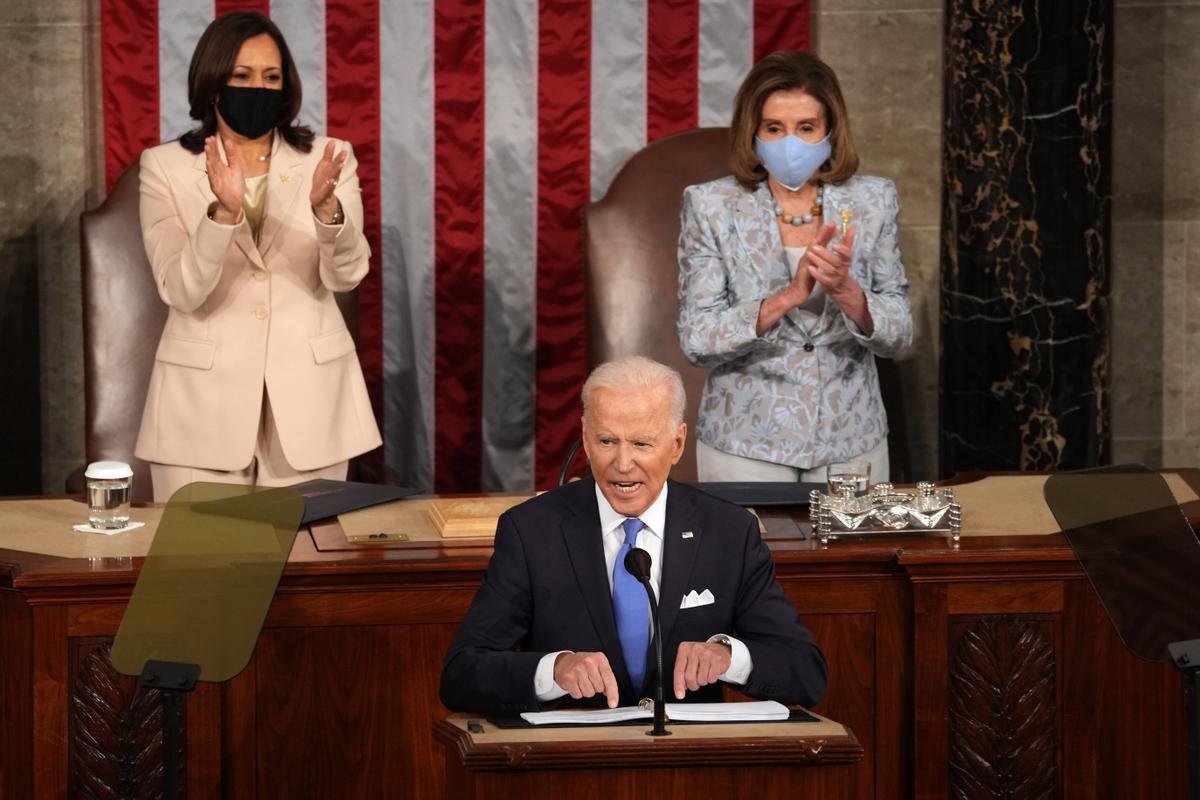
Joe the Revolutionary
(Spain) on 29 April 2021
by Cristina Manzano (link to original)
The question hovers in the air. Will one of the most stereotypical presidents, during one of the most unusual moments in history, be able to turn the tide and heal the country’s deep open wounds?
Upon hearing Joe Biden’s first address before a joint session of Congress and the Senate, one might think the answer was yes. It was, incidentally, an unusual session; it should have taken place earlier and in a packed chamber. Instead, there were empty seats, masked members of Congress, and the powerful image of two women presiding over the session: House Nancy Pelosi and President of the Senate Kamala Harris.
By listening to Biden taking stock of his first 100 days at the head of the White House, one can feel how much American politics have changed. First, in terms of tone, which is so important when the images of the assault over the same podium where he delivered his speech are still fresh in everyone’s memory.
The president’s chest swelled with pride in speaking of the more than 200 million doses of COVID-19 vaccine that have been administered in the past three months and of the more than 1.3 million jobs that have been created – “More new jobs in the first 100 days than any president on record." Biden also proudly recounted the distribution of checks to tens of millions of families to weather the crisis caused by COVID-19. The projected 6% growth for this year, backed by the International Monetary Fund, suggests that financial recovery is on its way. “America is on the move again,” Biden asserted. [https://www.whitehouse.gov/briefing-room/speeches-remarks/2021/04/28/remarks-as-prepared-for-delivery-by-president-biden-address-to-a-joint-session-of-congress/]
Biden also took the opportunity to remind listeners bout the two great spending packages he has already proposed: the rescue plan — which was passed — and the huge infrastructure plan (which must still proceed in Congress) with its second part, the families plan, which he disclosed during the speech. The expected investment of about $6 trillion; an amount against which the European Recovery Plan pales in comparison and that is intended to restore the role of the government in a way that has not been seen since the days of Ronald Reagan.
Biden did not leave anyone or anything out: women, African Americans, China, immigrants, Iran, climate change, and guns. He called on Republicans to join forces several times, although he warned them that he would proceed with or without them. Three key concerns emerged from his talk: people, government and time.
He spoke of regular people, the middle class who built the country. Those who still stand in line to get food, who have had to close down their businesses or have lost their jobs due to the pandemic, who struggle or cannot pay for health care or medication. Apart from creating jobs and direct aid, the new plan offers to strengthen education, support for child care and elder care, and coverage for sick leave for all of them. Moreover, the plan offers to strengthen the role of unions and access to health care, one of the Democrats’ perpetual hobbyhorses.
All of this must be done by giving the government its rightful role. Transformation of infrastructures — physical, digital, human, scientific and technological — can only be encouraged by the government. And how does Biden intend to pay for it? By raising taxes on corporations and the rich, many of which have avoided their fiscal obligations in recent years. For Biden’s critics, his definition of “wealthy” — those with annual incomes of more than $400,000 — is more than lenient and will fail to generate enough income to cover the proposed packages. To a European, his proposals may sound more than familiar. To many Americans, they sound radical.
The president now faces a race against time. Despite the fact that the scope of many of his proposals is long-term, he knows he has a mere two years for them to bear fruit and to persuade both society and a Congress with a fragile majority that this is the way to reinforce the future. Shared prosperity is a first step toward staunching the wounds. The risk is high that Republicans will gain strength in the 2022 midterms and torpedo the rest of Biden’s presidency.
Biden is setting his election agenda in motion at a good pace, and his approval rating is 59%, according to the Pew Research Center. Yet it is too early to know whether he will be a revolutionary capable of transforming and reuniting his country, or if this will all come to nothing more than a bunch of good intentions. For now, he shows good promise

